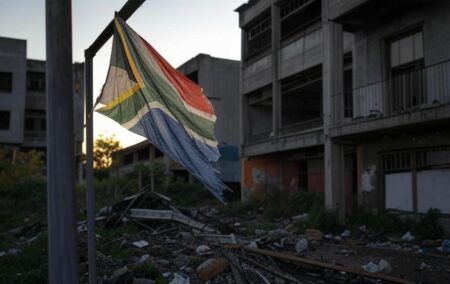South Africa is drowning under a tsunami of incompetence in every facet of life. Cadre deployment, affirmative action, black economic empowerment – call it what you will – it is killing a country rich with unrealized potential.
Initially confined to the state, these appointments of the inept are now found in every sphere, including the business sector and academia. When reference is made to a shortage of certain skill sets, this is often an artificial shortage – many competent black and white compatriots leaving the country in droves knowing they either do not have the right political connections or the required pigmentation to secure the jobs which their skill sets alone should have allowed them to secure.
The costs for the country are enormous. Without competent economic stewards to steer our sputtering economy, South Africa’s annual growth is less than one percent. Moreover, according to the Centre for Development and Enterprise’s Ann Bernstein, our sovereign debt, which was less than R650 million in 2009, is now at a record R5,5 trillion.
Shambles
Our schooling system is in a shambles, with teachers scarcely having the competence to teach the subject at the level required for pupils. Whilst often portrayed as a funding challenge, this is simply not true. There are several African countries who are spending less than us on education and whose outcomes are far better than ours. In his must-read book, Getting it Right: A new economy for South Africa, Philippe Burger illustrates how the South African Democratic Teachers Union (SADTU) is appointing teachers in several provinces.
Skill-sets here are of secondary concern to patronage networks. Upon matriculation, these students go on to university where universities cannot really acknowledge that 12 years of inept schooling can hardly be undone in a 3-year Bachelor’s degree irrespective of interventions undertaken. High pass rates are virtually guaranteed given universities’ dependence on state subsidies. In the process, mediocrity is increasingly institutionalized.
Sadly, mediocrity does not end there. Given the emphasis on both “transformation” and political correctness, universities chase employment equity targets. In my three decades in the university sector, I was confronted on several occasions where black students would toyi-toyi urging that a department send a `competent white lecturer’ to replace a black lecturer they perceive to be below par.
No compromise
In these situations, what black students instinctively knew and what university management refused to acknowledge – is that in education, as in much else, there can be no compromise on excellence. Sending less than competent lecturers to teach students affects not only those students’ future, but that of South Africa.
In an effort to cover up the failures of the appointment process, universities attempt to engage in various intervention efforts, which frankly are laughable: eg. the idea of sending academics with PhDs to writing workshops. It immediately raises the question of how these academics got their PhDs in the first place!
Mediocrity permeates everywhere. The poor stewardship of our security forces was evident in its inability to quell the July riots. However, it also manifests in the body bags of South African troops returning home from the Democratic Republic of the Congo or the Central African Republic.
Farmers cannot get their products to be exported from Richard’s Bay since those trucks are being attacked and torched on the highway to the port. Look at Intercape buses being attacked by taxi bosses in the Eastern Cape. Look at the countless women raped in this country every day.
Lawlessness
In this state of lawlessness, business confidence and profits are evaporating, and so are taxes to the state. In the process, state capacity is eroded – those taxes pay for the capacity within the state to govern for the well-being of all South Africans.
It is precisely for this reason that Francis Fukuyama’s majestic The Origins of Political Order, that traces the historic development of the state from ancient to modern times, places the level of ‘stateness’, or a state with capabilities, at the centre of order, stability, economic growth, peace and sustainable development.
Mediocrity undoes this level of stateness and is evinced by South Africa’s declining position on the Fragile State Index. The Fragile State Index monitors various factors which contribute to state fragility in 179 countries. These factors include the security apparatus, factionalized elites, group grievances, economic decline, uneven economic development, human flight and brain drain, state legitimacy, human rights and rule of law. By 2023, we slipped to 78 on the Index from 55 in 2007. According to the Index, this is the warning category. It is no coincidence that so many analysts have warned about the prospects of civil war, or at the very least, South Africa’s very own Arab Spring.
South Africa is confronted with a huge self-made crisis as we enter a turbulent 2025. We cannot afford mediocrity anymore, we cannot afford affirmative action any longer, we cannot afford patronage networks. We need to aggressively embrace excellence and a meritocracy if this beloved country of ours is to have a chance.
The views of the writer are not necessarily the views of the Daily Friend or the IRR.
If you like what you have just read, support the Daily Friend
Image: Created by Grok

